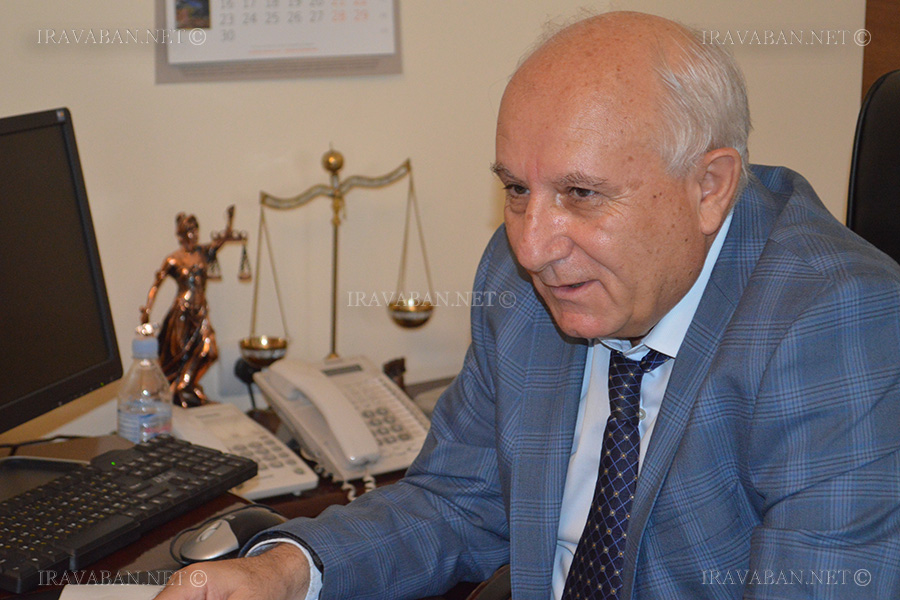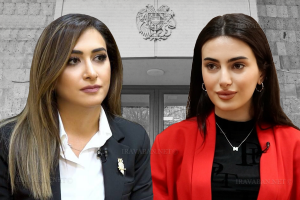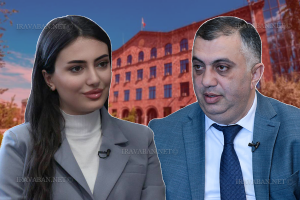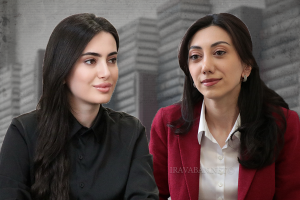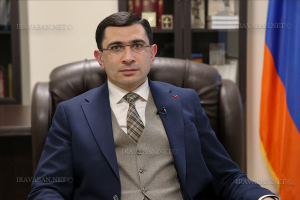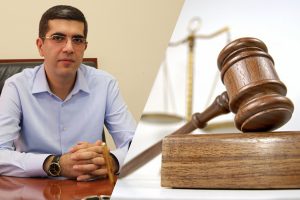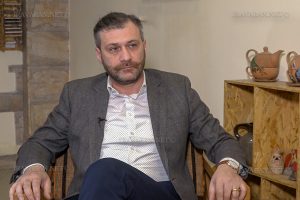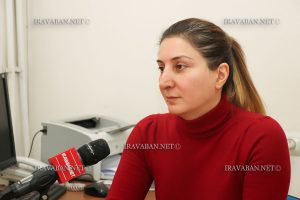Courts of all instances are overloaded. David Avetisyan, the Chairman of the Criminal Chamber of the RA Court of Cassation, mentions in his interview to Iravaban.net that they receive 5000 appeals per year, but they can investigate and make a decision on only 60-70 cases. We have talked to David Avetisyan on Constitutional amendments, problems in the judicial system, corruption risks in the field, and other issues.
– Mr Avetisyan, what does being the Chairman of the Criminal Chamber of the RA Court of Cassation mean to you: Is it just a position or…?
– It’s neither a position nor a title. For me, being a judge is a mission. I think that every judge should be the bearer of his mission.
– Why did you decide to become a lawyer? Have you ever imagined that you would become a judge?
– Becoming a lawyer was my childhood dream, but my father wanted me to choose that profession even more. Honestly, I have always thought that I would become a judge. And due to my efforts, as well as God’s providence, it’s been almost 34 years since I took on the mission of being a judge. I would like to mention that before becoming the Chairman of the Criminal Chamber I had to pass a very arduous and difficult path as a judge.
– Mr Avetisyan, you are the author of about 40 scientific works. What problematic issues have you addressed in them?
– My scientific works include different areas of law, but a significant part of them refers to the issue of ensuring the right to liberty and security of person. I have begun to deal with this theme since Armenia became a member of the European Council and accepted the jurisdiction of the European Court of Justice. Since that moment judges had to face numerous problems. Ensuring personal rights guaranteed by Article 5 of the Convention (right to liberty and Security of person – by author) was of special importance. I have both wrote monographs and published a series of articles on these theme. Taking into account the fact that we are currently at the stage of legal Constitutional and Judicial reforms, it is very important for every lawyer, including judges, to voice the issues they are concerned with.
– You spoke about constitutional reforms. The latter will entail significant changes in both the election process of judges of the Court of Cassation and the current status of the court. What is your attitude towards this issue?
– Constitutional amendments will not result in any significant changes in the current status of the Court of Cassation. As far as the changes in the process of appointing judges are concerned, I should mention that the proposed mechanism is applied in a number of other countries, and we can make conclusions on its efficiency in Armenia only after it is introduced.
In general, serious positive changes are expected especially in guaranteeing independence of judges. I consider it positive that the voucher for the independence of judges will be the Supreme Judicial Council which, in fact, will resolve the issues of election and advancement of judges, as well as imposing disciplinary sanctions on them. That is, a powerful body will be established to guarantee the independence of the judicial system.
The order of appointing chairmen of courts for a term is important as well, because the judge must have not only external but also inner independence. I think that the appointment of the chairmen of courts, as well as the chairmen of Chambers of the Court of Cassation, for only one term will also ensure their inner independence.
– By the way, the Venice Commission saw a problem in the draft regarding the fact that the chairman and the judges of the Court of Cassation will be appointed by the National Assembly, which can ruin the independence of the judiciary.
– In fact, I do not see any risks at all, especially since that is a working model in some countries.
– What problems concerning the Supreme Judicial Council will you point out?
– At this moment, I see only one problem. I think that the decisions on subjecting judges to disciplinary liabilities should be appealable, while such a legal possibility is not provided by the draft. The Supreme Judicial Council will act as a court on the mentioned issues, and the decision of the court will be appealable. International experts always focus on this issue. I believe that there is a problem of ensuring independence and protection of rights for a judge.
– Is it already known who will be included in the staff of the Council, and will there be other people involved in it in addition to the judges?
– According to the Constitution draft it is going to be composed of five judges and five prominent legal scholars. Embodying international experience at our disposal, we have suggested that the judges form a majority in the Council, but it is still under discussion.
– What approaches do you have in relation to the improvement of judicial system and have you presented them to the Committee of Constitutional Reforms?
– First of all, I want to mention that I have got much more radical ideas about the improvement of the judicial system, and of course I have communicated my vision to the Committee. For example, I suggest that the system of grand jury and assizes be introduced in our country. I think that it is needed especially when hearing two types of cases: Those of high-ranking officials and the ones that end with life imprisonment. It seems that the public is not confident about the solutions to be given to these types of cases. And if the jury gets involved in such cases, many problems will be solved. In general, I think that the society’s involvement in the administration of justice will be an important tool to increase public trust towards the courts. The public trusts the judiciary when it is allowed to take part in the administration of justice as well. Many countries have gone down that path.
– As you spoke about the confidence in the judicial system, I have a question to ask. A few years ago the Human Rights Defender published a high-profile report where the bribes accepted by judges in different cases were indicated in numbers. I would like to know your opinion on that report and the risk of corruption in the judiciary.
– Firstly, what was mentioned by the Human Rights Defender should not be accepted as a proven fact, and judgments should not be made based on it. I think it was the result of his subjective perception, and the Association of Judges published an appropriate statement on the report.
As for the trust toward the courts, we clearly have problems here, and I do not exclude the possibility of corruption risks. But when talking about the trust issue we cannot rely on the judgment of amateurs. Conclusions can be drawn only from professional studies conducted by recognized organizations.
As a credible investigation, I can recall the public opinion monitoring held in the Republic of Armenia in 2013 by AM Partners Consulting Company Ltd in the framework of Second Judicial Reform Project funding received from the World Bank. The results of the monitoring were the following: 59.1 percent of respondents fully and largely trust the courts, 38.3 percent completely or mostly do not trust the courts. These figures show that we still have work to do.
The risk of corruption might exist in all spheres, the problem lies in the number of risks. We cannot fight corruption by speaking and changing names. We need to develop mechanisms and show a systematic approach in order to exclude corruption, at least reduce it to a minimum, so that the public trust towards the courts increases.
– And what mechanisms would you suggest?
I have already mentioned one of the mechanisms, that is the introduction of the system of jury. I also think that it is appropriate to include representatives from society and mass media into the Council of Court Chairmen and the Supreme Judicial Council. We might also introduce the American system of assigning punishments where the subjective approach of the judge is reduced to a minimum.
– Mr. Avetisyan, aren’t there any concerns related to jury, namely that the judges will blame the mistakes on the jury?
– I have worked with the jury for nine years and I can assure you that that institute has worked wonderfully. There has never been a case when a juryman suggested, “Let’s be softer with this one, as he is my relative.” And there has not been a case when the judge blamed the juryman. I think no judge will allow himself to do such a thing. I cannot understand the reason for the complaints. This institute works very successfully in Russia and in Georgia. I think the people complaining are the ones who don’t want an impartial judicial act to be made.
Unfortunately, after long-term discussions the Committee rejected the introduction of that institute. I understand that many people dislike it, but if we truly want to change something, we must go this way. What’s wrong about it: A person can study at the Academy of Justice for maximum 10 months, then graduate and give a life sentence. But one must have experience, knowledge, civil courage, and a lot of other things in order to make such a decision.
– A new Criminal Code is being developed these days. What is your opinion on including criminalization of illegal enrichment in the Code? As we have spoken about the fight against corruption, I would like to mention that such provisions are adopted in the countries that succeeded in their fight against corruption.
– Frankly speaking, I do not think that its criminalization is the right thing to do but I am aware of that approach. If I am not mistaken the provision was adopted by 2 countries only for this question is very controversial: As a result, the presumption of innocence is violated. For example, they will say that if you have spent an amount of money then you have become rich and can’t account for that. If it’s not the case then you have to prove that you have become rich legally. So the burden of proof is on the person. But the responsibility of collecting proof and accusing the person lies with the state, doesn’t it? It turns out that we accuse the person and he/she is to prove his/her innocence, which I do not consider to be acceptable from a human rights perspective.
– Let’s speak about the work overload of the courts. Isn’t it logical to think that it can result in judicial mistakes?
– You are right. Our judges are very overwhelmed by workload. If we compare us to European countries we will see that we have a significantly smaller number of judges per 100.000 inhabitants. And this situation creates a very intense atmosphere which can obviously result in procrastination and judicial mistakes.
The judge must not hurry, but we have some judges who have 1500 civil cases in their proceedings instead of the standard 80-100. They are so overloaded with work that they cannot understand what to do with different cases, when to postpone a case and from where to continue. If the judge cannot find time to examine the material of the case the right of fair trial is being violated. A significant number of judicial overrulings are caused by the judges’ haste and overload. This is one of our most painful questions. It’s impossible to actualize justice working this way. We have to undertake measures against this.
– Attorneys have been reporting for years that the complaints sent to the Court of Appeals do not advance to proceedings and the decisions of rejection are almost always the same.
– They are right. I will speak here about the Criminal Chamber of Court of Appeals. Many cases do not go to trial because the Chamber can examine only 60-70 cases a year. Sure, every attorney wants his complaint to be heard and to find solutions for his/her defendant. But we should think about global problems. The Court of Appeals has a constitutional mission, that is to provide a uniform application of laws. That’s why they choose 70 cases out of 1500 and make decisions that benefit not one person but 1000 people, for example.
Recently we have made a decision about hooliganism, and the limits of application of hooliganism crimes became narrower. As a result, the number of sentenced people decreased by 40%. That is the job of the Court of Appeals. It is not about taking 1500 cases and making separate decisions on all of them.
The attorney’s job is to solve his/her problem, and the job of the Court of Appeals is to solve the problems of thousands of people in one case. But this doesn’t mean that complaints against obvious illegal judicial acts may not move to proceedings.
– Mr Avetisyan, but is that not a violation of human rights when the Court of Appeals does not allow the case to move into proceedings?
– Of course not, according to the protocol attached to the European Convention the judicial system of countries must have a First Instance Court that is to examine the case on the basis of both facts and rights, and a Court of Appeals that is to check the legitimacy and justice of the decisions made by the First Instance Court. That is to say, citizens’ rights must be protected in the Court of Appeals. And in case of having another court it must be contemplative.
The USA has about 320-million population and the Supreme Court receives 9000 complaints every year. We receive about 5000 complaints every year. In terms of workload, we have serious problems here.
– I would like to ask you one more question. Do people often curse the judges and say profanities to them after hearing the verdict? How do you manage to deal with that?
– I should say that our judges are quite tolerant in such cases whereas in other countries people get imprisoned for insulting the judge. Our judges understand people’s situation and do not want to make radical steps. I do not know whether it is good or not but, given the economic situation in the country today, probably liberal approach is somewhat permissible.
Interview: Laura Mayna
Photo: Astghik Karapetyan

